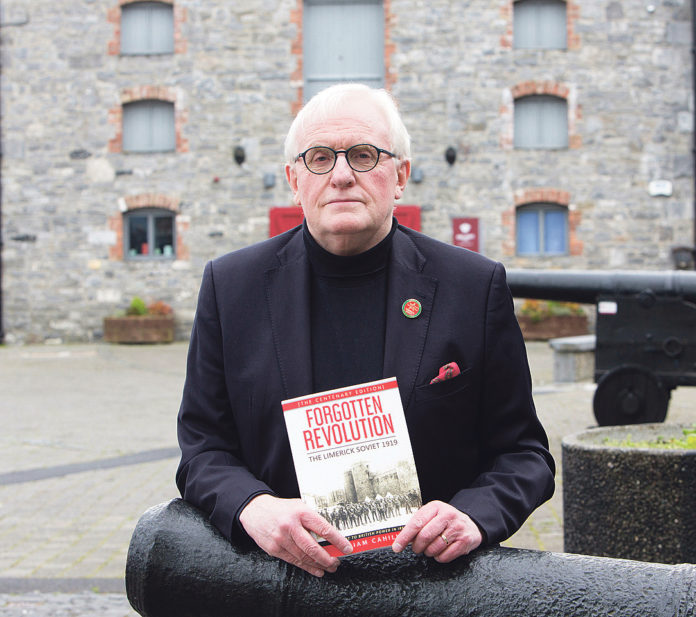
THE author of a new book on the role played by workers and trade unions in the War of Independence has called on historians to completely re-assess their attitude to the Labour movement’s involvement in the conflict.
Liam Cahill, author of ‘Forgotten Revolution – The Limerick Soviet 1919 said the Decade of Centenaries had seen a welcome re-appraisal of the role of women in the War. However, historians should now avail of the Decade’s remaining years to conduct a fuller and fairer review of Labour’s important role.
He was speaking in advance of the launch of his new book by Irish Congress of Trade Unions President Sheila Nunan in the Granary Library on Monday evening.
“From 1916 to 1919, there was close collaboration between organised workers and the Irish Volunteers and Sinn Féin, both nationally and locally. The highpoint of that cooperation was the defeat of Conscription in April 1918,” he explained.
“My research shows that the ‘Limerick General Strike against British Militarism’ a year later – known as the Limerick Soviet – was the other significant event where that happened”.
For two weeks, through the Limerick United Trades and Labour Council, workers took over the entire running of the city as part of a General Strike against the imposition of military law, following the shooting dead of a policeman and an IRA prisoner during a rescue attempt in a local hospital.
The Limerick Soviet printed its own currency and published its own newspaper and received worldwide media coverage.
‘Historians should stop writing off the Limerick Soviet as a kind of exotic aberration in the ‘Confraternity’ city. It was spearheaded by workers and their representatives but with considerable logistical support in the background from the re-invigorated Irish Republican Brotherhood and the Irish Volunteers.
“The leadership of the First Dáil, as well as national leaders of the IRB and the Volunteers, were in touch daily with Limerick and the Dáil cabinet discussed the crisis three times. It was the cabinet’s decision – against IRB advice – not to support a national strike that forced the Soviet to end.
“The real significance of the Limerick Soviet is as a spontaneous eruption of grassroots militancy and impatience with the slow pace of action against British rule, and in that respect, it is comparable to the first shots of the War of Independence fired at Soloheadbeg only a few months earlier”.
Mr Cahill called on Limerick’s third level institutions to engage more fully with the history of the Soviet and its links to national historical developments.
“There is room for more collaborative community-linked projects, oral history projects, retrieval and conservation of memorabilia as well as a variety of artistic and cultural responses,” he said.
Forgotten Revolution’ is available from Amazon and other online booksellers in paperback and Kindle format and will be on sale in independent bookshops throughout the country.


